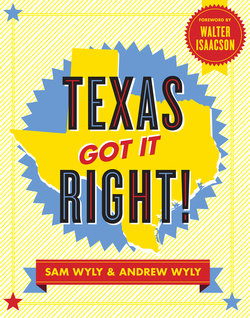Читать книгу Texas Got It Right! - Sam Wyly - Страница 15
На сайте Литреса книга снята с продажи.
ОглавлениеWashington and wants to bust up the banking
giants—is walking in the footsteps of great populist
Texans who came before him: fellows like Governor
Jim Hogg, who made it his life’s mission to break the
railroad monopoly that was strangling Texan farmers
and merchants at the end of the 19th century.
My Scots-Irish ancestors knew something about
the struggles of the common man as they made their
way to Texas. Combative and cussedly independent,
those Borderer clans left the British Isles, where only
nobility could own land, in search of soil they could
call their own. They were suspicious of authority and
were a literate bunch, schooled by Presbyterian
preachers. My great-great-great-granddad Hezekiah
Balch (born in 1741) was a Princeton grad and went
on to found the first college in Tennessee. My great-
granddad Sam Y. Wyly (born in 1815) was a Princeton
man, too, and he set up some of the first schools west
of the Cumberland Gap.
The Scots-Irish first settled along the Eastern Sea-
board and in Appalachia, but slowly and doggedly they
moved south and west, to places like Louisiana, where
I was born, and on into the vast rangelands, piney
woods, and bottomlands of Texas, where they saw the
promise of being the masters of their own destiny.
The Scots-Irish took naturally to the cause of
Texan independence from Mexico, and their contrar-
ian, populist spirit still burns in Texan hearts today.
That spirit and fight are what made Manifest Destiny
possible and gave shape to the USA as we know it.
Those frontier folks had to whip the French Empire
(1763) to open the way for the Louisiana Purchase.
Then they whipped the English Empire, twice. Then,
with the Texas Revolution and the Mexican-
American War, they whipped the Spanish Empire.
Other waves of newcomers came to the Lone
Star State in those early years, too: the Germans
after 1848, then the Czechs, Poles, and Italians,
paving the way for today’s immigrants from the
Middle East, Southeast Asia, and beyond. Their
stories got woven in with those of the Spanish mis-
Signage for a 2012 production of Giant at the Wyly Theater in
Dallas. When the movie version of Giant came out in 1956, its
iconic story and imagery played a big part in making Sam
Wyly want to move to Texas.
sionaries who’d come to Texas in the 1700s, shaping
the land with their religious missions and vaquero
traditions. Those Tejanos left their native Mexico
behind and gave Texas the strong Hispanic imprint
that is such a big part of our state’s identity today.
About that “Texas identity”—well, it’s something
special. No other state in the union has anything like
it. You’re never going to hear people say, “Don’t mess
with Delaware!” or “Don’t mess with Illinois!” When
you put down roots in Texas, something in you
changes, no matter where you’re from or what reli-
gion or politics you practice. You’re a Texan first,
then a Mexican-American or Asian-American or
Christian or Jew or liberal or conservative.
TEXAS GOT IT RIGHT!
15
